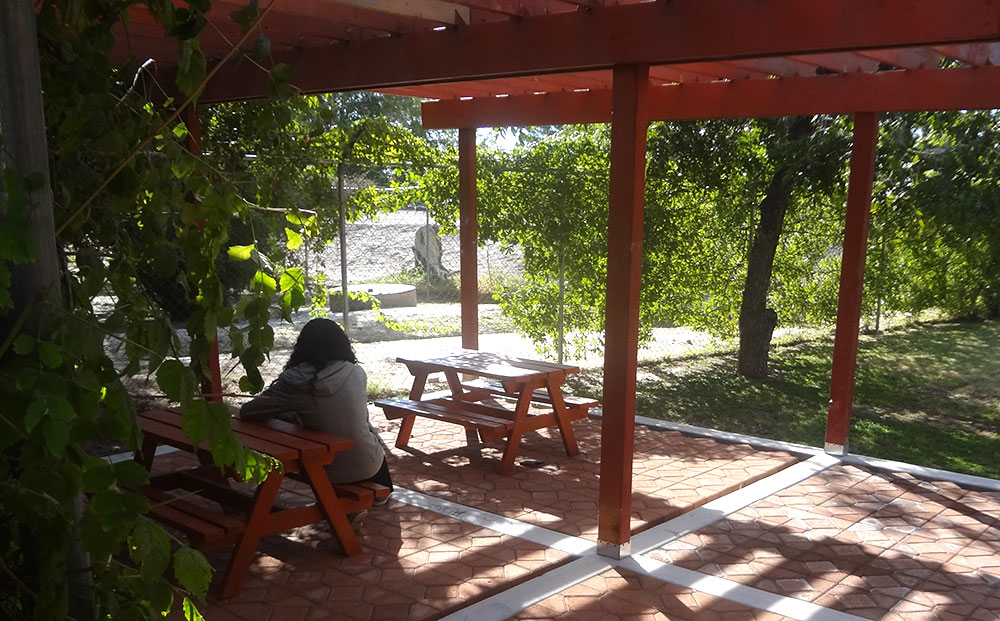
Women who are trafficked into the U.S. are often kept secluded and isolated to avoid suspicion. (Nadia Garcia/Borderzine.com)
EL PASO – The car headlights flashed past the windows of a farmer’s house out on a rural road in far west Texas on a sweltering, summer night bringing him outside to find out what the unusual midnight activity is all about.
In the distance, he saw the car slowly approach a trailer parked in a desolate area and a man get out and open the trailer.
“It has got to be a drug deal going on out there,” the farmer told Border Patrol officials in Hudspeth County, approximately 84 miles east of El Paso, Texas. Days later, Border Patrol officials broke into the trailer and found five Honduran women, dirty and barely clothed, shackled to cots.
Between 18,000 and 20,000 persons are trafficked into the U.S. each year with the majority of cases involving sex trafficking of women and children. Authorities say this major global problem can be discovered and dealt with if proper education and awareness is instilled in residents of the U.S.
According to the National Human Trafficking Resource Center (NHTRC), sex trafficking is defined as a commercial sex act that persons are forced into by fraud or coercion or if the person is a child. This also applies to those over the age of 18 who are forced into involuntary servitude, peonage, debt bondage, or slavery to perform sex acts.
Women who are trafficked into the U.S. are usually promised a paying job and an opportunity for a better future, but are left unpaid and unable to contact family members back home. They are often kept secluded and isolated to avoid suspicion.
El Paso County established a human trafficking task force to combat trafficking in the area. The group includes various governmental and non-governmental institutions such as the F.B.I., the El Paso Police and Sheriff’s Departments, and the Salvation Army.
“When being asked to help out with the issue of human and sex trafficking, I was told this story about these Honduran woman by border officials five years ago and it immediately convinced me and the other Sisters to join the El Paso Human Trafficking Task Force,” 65 year-old Sister Francis of Casa Alexia explained.
Casa Alexia, a Catholic border ministry that works with the El Paso Salvation Army and Rescue Mission of El Paso helps poverty stricken individuals find shelter, food and hope in times of economic hardship. Casa Alexia now helps undocumented women who have been trafficked into the U.S. find either shelter or guidance after their traumatic experiences.
“My main duty is to go inform the El Paso and surrounding communities about human and sex trafficking because many of the residents are not educated on the subject,” Sister Francis said. “They assume that these victims are just illegal immigrants but residents do not realize that they may be in danger of their lives.”
A Power-Point presentation, posters and flyers have been created by the five Casa Alexia Sisters to help educate the public. The posters feature the eyes of a woman with the words “Human Trafficking: A Global Problem. Prostitution. Servitude. Forced Labor,” in bold letters at the top with information explaining what sex trafficking is, indicators of victims being trafficked and an 800 number to call to report suspicious activity. Persons exhibiting the indicators usually lack ID, have been forced into sex trade and have been harmed or denied food, water, sleep or medical care.
Sister Francis explained that she goes out to annual Kermes’, which are annual fund-raising events for the church in the community that have food, games and entertainment, and passes out flyers to educate the community on trafficking.
On one occasion, a local police officer in San Elizario, Texas got a hold of one of the flyers and started asking her questions about sex trafficking. “I was shocked that a police official was not well informed on Sex Trafficking and he’s so close to the border where a lot of this happens,” Sister Francis said. “Residents and government officials need to be educated and aware of this terrible trend so they can save a person’s life and prosecute those who tortured them. Without awareness, there is not much that can be done to save them.
Truck drivers are another target audience Casa Alexia tries to educate. According to a report generated by the Polaris Project and the NHTRC, out of 756 hotline calls in 2011, 185 were from callers identifying themselves as truckers. “Truckers are one of the main sources of information for the hotline about situations of sex trafficking involving minors. Of the total calls from truckers 52 percent included reports about potential cases of human trafficking,” the report stated.
These victims are typically controlled through “pimp-controlled” sex trafficking, which involves women and children engaging in commercial sex with their “pimp” or “daddy” often requiring their victims to meet a daily quota in order to avoid violent consequences. Truck stops across the U.S. are marketplaces used by pimps to maximize their profits.
“I’ve never been informed or educated to report unusual activity happening at truck stops but I have seen very young girls approach and knock on other trucker’s doors,” Thomas Rocker of a private owned trucking company said.
The lack of education and information on sex trafficking can cause a trucker to not be fully aware of what to look for in enslaved victims and possibly save their lives.
“There is never any presence of police around these areas so I can see why these girls are exploited and sold here by their pimps,” Rocker said. “If there were more officials present, I believe situations like sex trafficking could be prevented.”
According to the El Paso Police Department, officers are not allowed to stay at truck stops unless they are specifically dispatched to the location. This makes it difficult for officers to patrol truck stop areas to observe any potential sex trafficking.
Victims become prized possessions to pimps because of the large amount of money they bring them. The Polaris project estimates that a pimp who demands $500 per night, seven days a week from three girls he traffics, has the potential to make an annual salary of $632,000 dollars. This requires his slaves to perform sex acts with more than 30 men per night.
The victims who are able to escape or be freed from their sex trafficking enslavement turn to non-governmental agencies like Las Americas Immigrant Advocacy Center in El Paso to renew their lives.
“We work with human trafficking victims and help direct them to appropriate agencies that can provide them with a place to be housed, fed, clothed and counseled at little or no cost,” Katie Hudak of Las Americas said.
Las Americas also works alongside the Battered Immigrant Women Program to help victims deal with the post-traumatic stress of being trafficked, abused and lied to by their owners. Hudak stressed that awareness must be present in all regions throughout the country.
Hudak also reported that some victims have been offered T-Visas, which allow them residency in the U.S. and possible work while the individual who trafficked them are under investigation or prosecution.
Both government and non-government officials recognize that sex trafficking is an issue that needs constant supervision and the awareness of citizens so they can identify “red-flags” and report the criminals.


